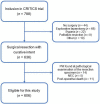Risk Factors for Metachronous Isolated Peritoneal Metastasis after Preoperative Chemotherapy and Potentially Curative Gastric Cancer Resection: Results from the CRITICS Trial
- PMID: 34572852
- PMCID: PMC8469213
- DOI: 10.3390/cancers13184626
Risk Factors for Metachronous Isolated Peritoneal Metastasis after Preoperative Chemotherapy and Potentially Curative Gastric Cancer Resection: Results from the CRITICS Trial
Abstract
Gastric cancer (GC) patients at high risk of developing peritoneal metastasis (PM) as a single site of metastasis after curative treatment may be candidates for adjuvant prophylactic strategies. Here we investigated risk factors for metachronous isolated PM in patients who were treated in the CRITICS trial (NCT00407186). Univariable and multivariable analyses on both metachronous isolated PM and 'other events', i.e., (concurrent) distant metastasis, locoregional recurrence or death, were performed using a competing risk model and summarized by cumulative incidences. Isolated PM occurred in 64 of the 606 (11%) included patients. Diffuse or mixed histological subtype, ypT4 tumor stage and LNhigh (ypN3 lymph node stage or a lymph node ratio >20%) were independent risk factors for isolated PM in both univariable and multivariable analyses. Likewise, LNhigh was an independent risk factor for 'other events'. Patients with tumors who were positive for all three independent risk factors had the highest two-year cumulative incidence of 43% for isolated PM development. In conclusion, diffuse or mixed histological subtype, ypT4 and LNhigh were identified as independent risk factors for isolated PM in patients treated with preoperative chemotherapy followed by surgical resection. The combination of these factors may identify a subgroup that may benefit from PM-preventing treatment strategies.
Keywords: gastric cancer; metachronous; multimodality treatment; peritoneal metastasis; risk factors.
Conflict of interest statement
M.V. and A.C. have received grants from the Dutch Cancer Society, the Dutch Colorectal Cancer Group and Hoffmann La Roche. N.C.T.v.G. has received grants from the Dutch Cancer Society and The Netherlands Organization for Health Research and Development.
Figures





References
-
- Al-Batran S.-E., Homann N., Pauligk C., Goetze T.O., Meiler J., Kasper S., Kopp H.-G., Mayer F., Haag G.M., Luley K. Perioperative chemotherapy with fluorouracil plus leucovorin, oxaliplatin, and docetaxel versus fluorouracil or capecitabine plus cisplatin and epirubicin for locally advanced, resectable gastric or gastro-oesophageal junction adenocarcinoma (FLOT4): A randomised, phase 2/3 trial. Lancet. 2019;393:1948–1957. - PubMed
-
- Cunningham D., Allum W.H., Stenning S.P., Thompson J.N., Van de Velde C.J., Nicolson M., Scarffe J.H., Lofts F.J., Falk S.J., Iveson T.J. Perioperative chemotherapy versus surgery alone for resectable gastroesophageal cancer. N. Engl. J. Med. 2006;355:11–20. doi: 10.1056/NEJMoa055531. - DOI - PubMed
-
- Seyfried F., von Rahden B.H., Miras A.D., Gasser M., Maeder U., Kunzmann V., Germer C.-T., Pelz J.O., Kerscher A.G. Incidence, time course and independent risk factors for metachronous peritoneal carcinomatosis of gastric origin–a longitudinal experience from a prospectively collected database of 1108 patients. BMC Cancer. 2015;15:73. doi: 10.1186/s12885-015-1081-8. - DOI - PMC - PubMed
-
- Spolverato G., Ejaz A., Kim Y., Squires M.H., Poultsides G.A., Fields R.C., Schmidt C., Weber S.M., Votanopoulos K., Maithel S.K. Rates and patterns of recurrence after curative intent resection for gastric cancer: A United States multi-institutional analysis. J. Am. Coll. Surg. 2014;219:664–675. doi: 10.1016/j.jamcollsurg.2014.03.062. - DOI - PubMed
LinkOut - more resources
Full Text Sources
Miscellaneous

